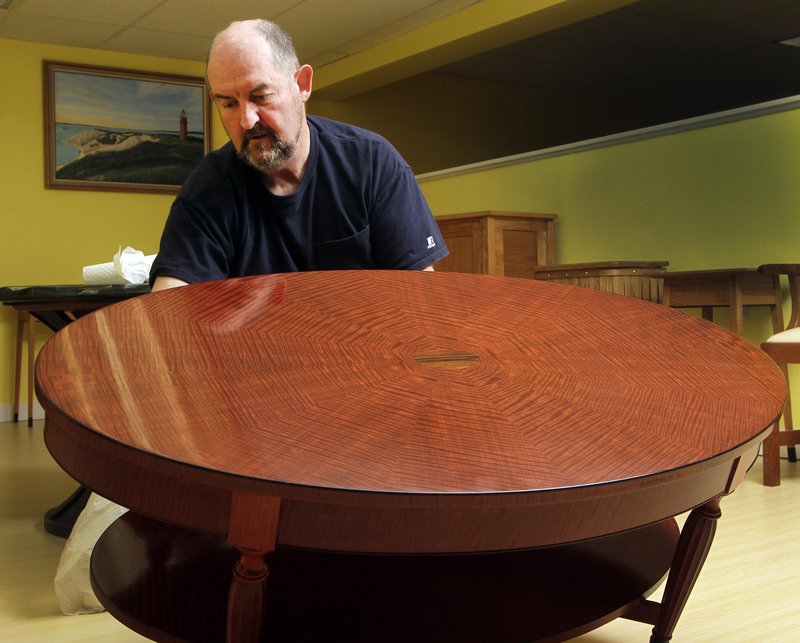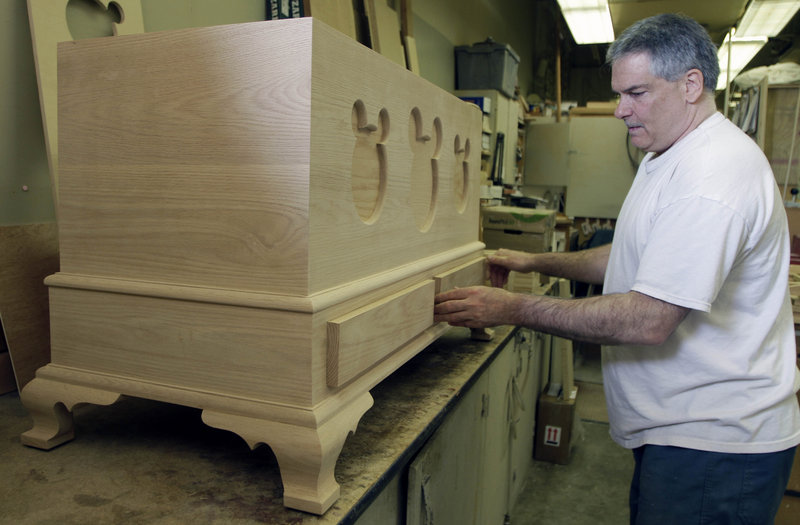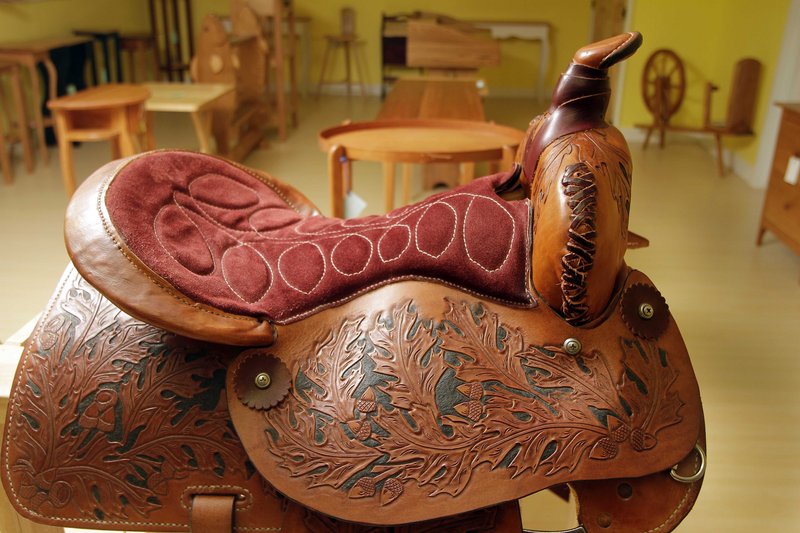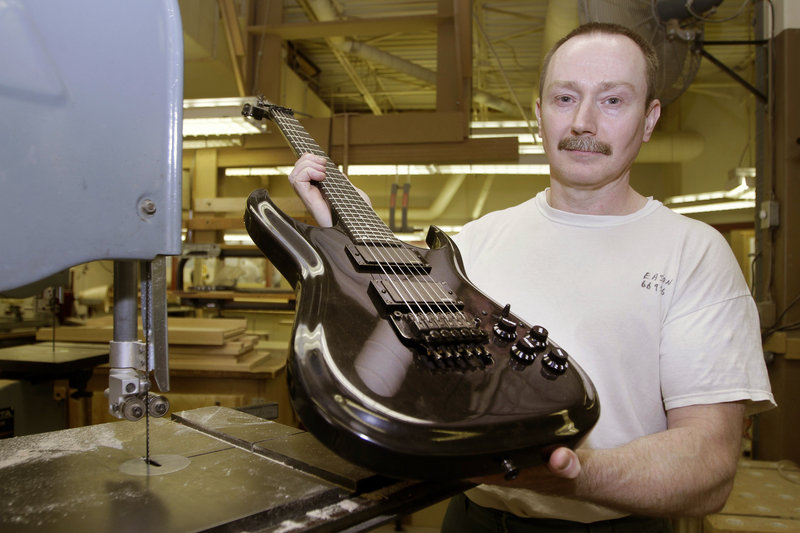FRANKLIN, N.H. – A new gallery featuring the works of master furniture makers and other artists will have its grand opening this weekend, but the artisans won’t be there to collect payment or praise.
They’re all behind bars.
The new gallery at Grevior Furniture in Franklin is named Corrections Creations and launches its official opening with a weeklong exhibit of solid wood furniture, baskets, woodwork and paintings titled Behind the Walls Craft Exhibition.
The convicts who crafted the furniture are taught by master furniture makers and several have become juried master furniture makers, even though they can’t leave the confines of the New Hampshire state prison.
Their work will be exhibited alongside pieces made by master furniture-making mentors who are members of the New Hampshire Furniture Masters Association. But the inmates’ furniture pieces — many featuring scrollwork, inlays and carvings — are priced far below the works of their mentors.
The inmates pay for their wood, tools and other supplies. Under the terms of the contract with Grevior, the inmates will get 70 percent of what their work commands. Grevior keeps 20 percent, and 10 percent is deposited in the prison’s recreation fund and benefits all the inmates. Furniture store staff members go to the prison and truck everything up to the store.
Grevior charges them no rent and pays for the utilities.
The women’s prison in Goffstown contributes knitted and crocheted work; the prison in Berlin sends ceramic vases.
But the furniture that was hauled into the gallery Friday and the bulk of the goods on display come from the Concord prison and its sizeable shop, where inmates must qualify for a coveted spot with perfect behavior and a prison job to pay for the materials they need to get started. John Limoge, the prison’s hobby craft shop supervisor, said the waiting list ranges from six months to two years.
Retired Superior Court Judge Kathleen McGuire was the driving force behind ratcheting up the prison’s furniture-making program to its present level, where clients commission custom pieces and collectors keep in touch with convicts.
On a tour of the shop more than a dozen years ago, McGuire learned the inmate woodworkers had no instructors or woodworking books. She donated many books from her own collection and enlisted Terry Moore to be a mentor. She knew Moore, a renowned furniture maker, from the Furniture Masters Association’s annual auction.
“Those guys are terrific — they’ve given so many hours,” McGuire said. “Terry’s really hooked.”
For nearly 13 years, Moore has gone behind bars and recruited others to join him. He says his first class, which lasted about three hours, was on how to make dovetail drawers.
“I didn’t go back for another month and there were dovetail drawers everywhere,” Moore said.
From the outset, Moore has worked with two inmates who are now master furniture makers — Eric Grant and Allen Eason.
“To master a craft takes discipline, total focus and attention,” Moore said. “I think it’s teaching them life skills as well as woodworking skills. It turns their lives around. It gives them a sense of worth.”
The furniture makers and other artists all used the same word to describe what the shop and their craft mean to them: “Escape.”
“It’s a sense of self-worth and self-esteem and a way to give back,” Grant said.
Grant and Eason are convicted killers who’ve been behind bars for decades. Both have sold pieces at the association’s annual auction.
“We appreciate them more than they’ll ever know,” Eason said of the mentors. “Without them, I wouldn’t be doing half the work I do.”
Grant is eligible for parole in about four years; Eason is serving life without possibility of parole.
“This is my life,” Eason said, gazing around the shop.
Priced at $1,599, Grant’s solid cherry, hand-carved Queen Anne side table is the most expensive of the pieces on display in Franklin. An oak trestle table, with five small drawers on top and three large ones below, is priced at $289. A five-compartment red mahogany sewing box is $140.
Smaller craft items fill a separate space on the store’s street level, including cribbage boards, wooden toys, nesting wooden shaker boxes, paintings and leather handbags and backpacks.
Limoge said he began looking for an outlet for the inmates’ work six years ago, when the prison industries’ retail space across from the prison began to pare back its hours. Grevior was the only furniture store owner who expressed interest once the project was posted by the state.
“Now we’re open seven days a week at Grevior’s,” Limoge said.
Send questions/comments to the editors.







Success. Please wait for the page to reload. If the page does not reload within 5 seconds, please refresh the page.
Enter your email and password to access comments.
Hi, to comment on stories you must . This profile is in addition to your subscription and website login.
Already have a commenting profile? .
Invalid username/password.
Please check your email to confirm and complete your registration.
Only subscribers are eligible to post comments. Please subscribe or login first for digital access. Here’s why.
Use the form below to reset your password. When you've submitted your account email, we will send an email with a reset code.